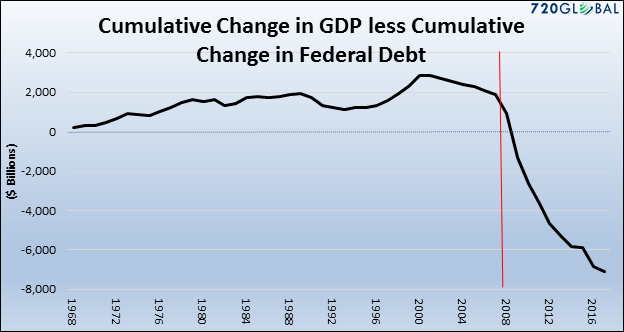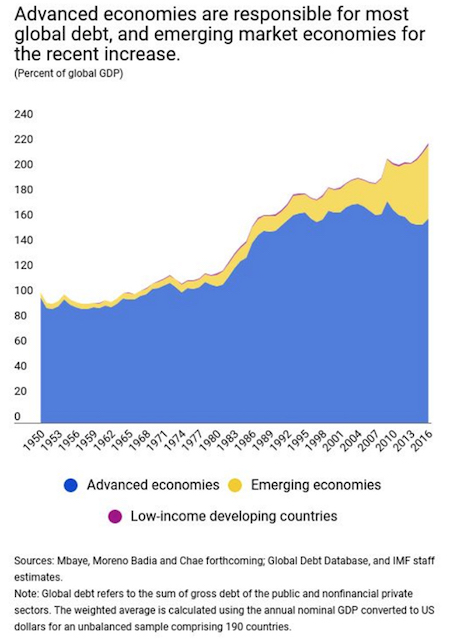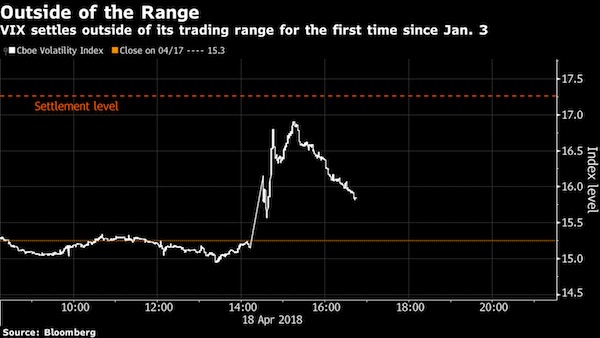
Edgar Degas The laundress 1873

We sold our souls to the Debt Devil. There has been no growth for years. We borrowed it all.
• Triffin Warned Us (Lebowitz)
Folklore states that Robert Johnson went down to the crossroads in Rosedale, Mississippi and made a deal with the devil in which he swapped his soul for musical virtuosity. In 1944, the United States and many nations made a deal at the crossroads in Bretton Woods, New Hampshire. The agreement, forged at a historic meeting of global leaders, has paid enormous economic benefits to the United States, but due to its very nature, has a flawed incongruity with a dear price that must be paid. In 1960, Robert Triffin brilliantly argued that ever-accumulating trade deficits, the flaw of hosting the reserve currency and the result of Bretton Woods, may help economic growth in the short run but would kill it in the long run.
Triffin’s theory, better known as Triffin’s Paradox, is essential to grasp the current economic woes and, more importantly, recognize why the path for future economic growth is far different from that envisioned in 1944. We believe the financial crisis of 2008 was likely an important warning that years of accumulating deficits and debts associated with maintaining the world’s reserve currency may finally be reaching their tipping point. Despite the last nine years of outsized fiscal spending and unprecedented monetary stimulus, economic growth is well below the pace of recoveries of years past. In fact, as shown below, starting in 2009 the cumulative amount of new federal debt surpassed the cumulative amount of GDP growth going back to 1967. Said differently, if it were not for a significant and consistent federal deficit, GDP would have been negative every year since the 2008 financial crisis.

[..] In 1960, 11 years before Nixon’s suspension of gold convertibility and essentially the demise of the Bretton Woods Agreement, Robert Tiffin foresaw this problem in his book Gold and the Dollar Crisis: The Future of Convertibility. According to his logic, the extreme privilege of becoming the world’s reserve currency would eventually carry a heavy penalty for the U.S. Although initially his thoughts were generally given little consideration, Triffin’s hypothesis was taken seriously enough for him to gain a seat at an obscure congressional hearing of the Joint Economic Committee in December the same year. What he described in the book, and his later testimony, became known as Triffin’s Paradox.
Events have played out largely as he envisioned it. Essentially, he argued that reserve status affords a good percentage of global trade to occur in U.S. dollars. For this to occur the U.S. must supply the world with U.S. dollars. In other words, to supply the world with dollars, the United States would always have to run a trade deficit whereby the dollar amount of imports exceeds the dollar amount of exports. Running persistent deficits, the United States would become a debtor nation. The fact that other countries need to hold U.S. dollars as reserves tends to offset the effects of consistent deficits and keeps the dollar stronger than it would have been otherwise.

The increase in Chinese debt is staggering. And worrisome.
• Global Debt Has Reached A Record High, And 3 Countries Are To Blame – IMF (MW)
Global debt has reached a record high, and three countries account for more than half of it, according to a new International Monetary Fund report released Wednesday. The IMF’s fiscal monitor said total debt reached $164 trillion in 2016, or 225% of global gross domestic product. That includes the debt of governments, households and companies. Compared with the previous peak in 2009, the world is now 12% of GDP deeper in debt, the IMF said. Just three countries — China, Japan and the U.S. — account for more than half of global debt, and China alone accounts for almost three-quarters of the increase in private debt since the financial crisis.
The IMF warns that countries with elevated government debt are vulnerable to a sudden tightening of global financing conditions, and it said advanced economies were resting on their laurels, with deficits remaining unchanged on average. It said the U.S. was the only advanced economy expecting an increase in debt-to-GDP ratio over the next five years. That’s due to the recently enacted tax cuts as well as the big increase in spending. The IMF said its U.S. forecasts are similar to those published by the Congressional Budget Office.


Trump as currency manipulator?
• Dollar Bears Beware, Trump Tweets May Not Be Enough (Karamanlis)
The entrenched bearish dollar view has all the ingredients to become the pain-trade of the year. It has become super crowded based on occasional utterances from the White House while ignoring a fundamental shift at the Fed. The Bloomberg Dollar Spot Index is hovering near a three-year low as uncertainties surrounding the Trump administration weigh on investor confidence. Be it verbal intervention toward a weaker currency, personnel changes or trade protectionism, the U.S. President has had a way of frustrating dollar longs. As a result, any rebounds in the U.S. currency this year have been short- lived. That’s led to a massive build in short-dollar positions. Hedge funds and other large speculators haven’t been more bearish on the greenback in more than five years, CFTC data show.
With less room for additional short exposure, dollar bears are going to need something more than the short-term turbulence generated by Trump. Those hoping for an assist from monetary policy are likely to be sorely disappointed. The Fed isn’t just retaining its bullish stance, it’s looking for a more aggressive rate-hike trajectory than the market anticipates. With almost half of Fed policy makers projecting at least four interest rate increases for 2018, upside risks prevail. Those risks may become more pronounced should the U.S. Senate confirm Richard Clarida as vice chairman. Clarida, no stranger to the notion of a total of four hikes this year, may spark another round of speculation on whether the FOMC could include a price-level target in its policy framework.
Soon-to-be New York Fed President John Williams also advocates such a shift, which Clarida said, in a Pimco commentary back in 2014, would – in theory – result in higher yields on longer-duration bonds. Given the dollar has been feeling the pressure of a flatter curve since late 2016, the all-new Fed may bring an end to fears that the curve’s shape portends a U.S. recession. After all, the composition of voting members this year has shifted from 2017’s dovish roster. Dollar pricing hasn’t reflected that. Even if Trump shifts away from weak-dollar rhetoric and the market catches up with the Fed’s dot plot, the dollar may struggle to gain the 6% needed to retest October’s highs. But that doesn’t mean we’ll see a slide to fresh, sustainable year-to-date lows.

Users must leave instead.
• Facebook Says Users Must Accept Targeted Ads Even Under New EU Law (R.)
Facebook said on Tuesday it would continue requiring people to accept targeted ads as a condition of using its service, a stance that may help keep its business model largely intact despite a new European Union privacy law. The EU law, which takes effect next month, promises the biggest shakeup in online privacy since the birth of the internet. Companies face fines if they collect or use personal information without permission. Facebook Deputy Chief Privacy Officer Rob Sherman said the social network would begin seeking Europeans’ permission this week for a variety of ways Facebook uses their data, but he said that opting out of targeted marketing altogether would not be possible.
“Facebook is an advertising-supported service,” Sherman said in a briefing with reporters at Facebook’s headquarters. Facebook users will be able to limit the kinds of data that advertisers use to target their pitches, he added, but “all ads on Facebook are targeted to some extent, and that’s true for offline advertising, as well.” Facebook, the world’s largest social media network, will use what are known as “permission screens” – pages filled with text that require pressing a button to advance – to notify and obtain approval. The screens will show up on the Facebook website and smartphone app in Europe this week and globally in the coming months, Sherman said.
The screens will not give Facebook users the option to hit “decline.” Instead, they will guide users to either “accept and continue” or “manage data setting,” according to copies the company showed reporters on Tuesday. “People can choose to not be on Facebook if they want,” Sherman said.

Time to get Facebook out of its misery?!
• Facebook To Put 1.5 Billion Users Out Of Reach Of New EU Privacy Law (R.)
If a new European law restricting what companies can do with people’s online data went into effect tomorrow, almost 1.9 billion Facebook Inc users around the world would be protected by it. The online social network is making changes that ensure the number will be much smaller. Facebook members outside the United States and Canada, whether they know it or not, are currently governed by terms of service agreed with the company’s international headquarters in Ireland. Next month, Facebook is planning to make that the case for only European users, meaning 1.5 billion members in Africa, Asia, Australia and Latin America will not fall under the European Union’s General Data Protection Regulation (GDPR), which takes effect on May 25.
The previously unreported move, which Facebook confirmed to Reuters on Tuesday, shows the world’s largest online social network is keen to reduce its exposure to GDPR, which allows European regulators to fine companies for collecting or using personal data without users’ consent. That removes a huge potential liability for Facebook, as the new EU law allows for fines of up to 4 percent of global annual revenue for infractions, which in Facebook’s case could mean billions of dollars. [..] The change affects more than 70 percent of Facebook’s 2 billion-plus members. As of December, Facebook had 239 million users in the United States and Canada, 370 million in Europe and 1.52 billion users elsewhere.
[..] In practice, the change means the 1.5 billion affected users will not be able to file complaints with Ireland’s Data Protection Commissioner or in Irish courts. Instead they will be governed by more lenient U.S. privacy laws, said Michael Veale, a technology policy researcher at University College London. Facebook will have more leeway in how it handles data about those users, Veale said. Certain types of data such as browsing history, for instance, are considered personal data under EU law but are not as protected in the United States, he said.

If possible, it’ll be done.
• VIX Rigging Talk Erupts on Wall Street After Another Wild Swing (BBG)
The Cboe Volatility Index is how Wall Street measures anxiety. Lately it’s the gauge’s own plumbing that’s making people nervous. It’s a recurrent claim – the VIX is rigged. It got a fresh airing Wednesday, when the index swung wildly just as derivatives on it were expiring. Billions of dollars are earned or lost as VIX futures settle. The concern is that owners of those wagers are willing to spend a few million to make them pay off. The suspicions are only that, suspicions. Volatility markets are too complex for easy conclusions to be drawn, and reasonable explanations have been offered for the patterns. But strange-looking outcomes have happened enough on VIX settlement day that the debate keeps being revived.

Cboe Global Markets declined to comment. Last month, Cboe CEO Ed Tilly said at a conference that “the integrity of our VIX products and markets is paramount. And, if our regulatory team were to uncover any manipulation, it would be rooted out, swiftly and decisively. Period.” Evidence the VIX is anything less than a pure readout on trader nerves would raise thorny questions for its overseers, who have succeeded in making it a central piece of Wall Street wiring. Its ability to turn stomachs was on display in February’s stock correction, whose worst moments came when the VIX doubled and wiped out bets on calm.
“You have people watching and using it as a barometer for all sorts of trading decisions,” Steve Sosnick, chief options strategist at Interactive Brokers in Greenwich, Connecticut, said by phone. “People take clues from what it’s doing as to what the market’s psychology is out there. But when the settlement time comes around, it can take on a life of its own.”

Lost a second one as well, on throwing out Carribeans who’ve lived in Britain for 50+ years.
• UK Government Loses Key Brexit Vote (CNN)
The UK Government has lost a key Brexit vote, with the upper House of Parliament backing calls to remain in the EU customs union after Brexit. The House of Lords voted 348 to 225 to amend the government’s EU Withdrawal Bill, which will now return to the House of Commons where the defeat is likely to spur renewed opposition. The amendment requires the government to report to Parliament by October 31 on what steps it has taken to remain in the customs union, which allows goods to flow freely across the EU. The government opposed the amendment. Prime Minister May had previously said Britain will not remain in the customs union after Brexit takes effect. The House of Lords is now considering other amendments to the proposed legislation.
The customs union enables the 28 EU member states, and other countries such as Turkey that have signed up to its rules, to function as a single trading area. In practice, it means that cars made in France can be sent to Italy without facing tariffs or a customs check at the border. Goods made outside the union are allowed to circulate freely once they’ve gained initial entry. However, membership prevents a country from negotiating its own bilateral trade deals with other nations. The ability to agree new trade deals – with the United States or China, for example – is central to Prime Minister Theresa May’s vision for Britain after Brexit. In a speech in September, she ruled out staying in the customs union.

The Empire strikes back.
• Lawmakers Make Criminal Referral on Clinton, Comey, Lynch to DOJ (Carter)
Congressional lawmakers made a criminal referral Wednesday to the Department of Justice Attorney General Jeff Sessions against former senior-level Obama administration officials, including employees of the FBI connected with the unverified dossier alleging collusion between the Trump campaign and Russia, as well as those involved in the warrants used to spy on a former Trump campaign volunteer, this reporter has learned. The lawmakers also made a criminal referral on former Attorney General Loretta Lynch and threats made by her DOJ against the FBI informant, who provided the bureau with information on the Russian nuclear industry and the approval in 2010 to sell roughly 20 percent of American uranium mining assets to Russia.
House Oversight and Government Reform Committee member Rep. Ron DeSantis, R-Florida, along with ten other colleagues sent the letter Wednesday to Sessions and FBI Director Christopher Wray criminally referring former FBI Director James Comey, former Secretary of State Hillary Clinton, former Attorney General Loretta Lynch, and former FBI Deputy Director Andrew McCabe for their involvement in the investigations into President Trump and alleged violations of federal law. FBI Special Agent Peter Strzok and his paramour FBI lawyer Lisa Page, whose anti-Trump text messages obtained by the DOJ Inspector General Michael Horowitz, were also included in the referral.

Limiting presidential powers may not be such a bad idea in the US. But to do it through a single state governor?
• New York Attorney General Wants Power To Bypass Trump Pardons (R.)
New York’s attorney general on Wednesday asked Governor Andrew Cuomo and state legislators to give him and other local prosecutors power to bring criminal charges against people pardoned by U.S. President Donald Trump. In a letter, Attorney General Eric Schneiderman urged Cuomo and legislative leaders to close a loophole in New York’s double jeopardy law shielding recipients of presidential pardons from state prosecution. A change could make it more difficult for Trump aides and others who might be pardoned to escape criminal prosecution, even if special counsel Robert Mueller’s probe into possible Russian interference in the 2016 presidential election were curbed or shut down.
The president has no constitutional power to pardon state crimes, but Schneiderman said the current law means defendants pardoned for serious federal crimes could be freed from “all accountability” under state criminal law. Schneiderman, a Democrat in his eighth year as attorney general, has made his office a central figure in blue state challenges to Trump, tangling with the Republican president on such matters as consumer finance, the environment, immigration and the 2020 census. Cuomo, a Democrat, is reviewing Schneiderman’s proposal, and “believes that the federal legal system should not provide a basis for any wrong doers to escape justice,” press secretary Dani Lever said in a statement.

33 prosecutors alone were involved.
• German Prosecutors Raid Homes Of Porsche Executives Over Dieselgate (Pol.)
German police carried out raids at properties linked to three current and former executives at Porsche today in connection with allegations of emissions cheating by the Volkswagen subsidiary. The raids covered ten properties across the states of Baden-Württemberg and Bavaria. The Stuttgart prosecutors office said in a statement they were “in connection with the manipulation of the emission control system of diesel cars.” Two of the executives still work for the carmaker, with one former employee also investigated as part of the probe. The individuals were not named by the prosecutor.
Porsche confirmed that documents were taken as part of the raids, adding that an Audi facility in Ingolstadt was also visited by authorities on Wednesday. The two carmakers said they are cooperating with investigating teams. Previously, authorities in Stuttgart, where Porsche is based, and Munich have launched smaller raids on homes and offices connected with officials at Audi and BMW over alleged emissions cheating. Volkswagen was caught out by U.S. authorities in September 2015 for installing defeat device software in 11 million diesel vehicles sold worldwide. Since then, the carmaker has agreed to pay out some $25 billion in compensation and settlements in the U.S.

Erdogan called a snap poll on June 24. Then he can really act as an emperor. Beware.
• Turkey Disputes Sovereignty of 152 Greek Islets (GR)
Ankara has issued a list of 152 Greek islets, disputing their sovereignty and the international treaties that have established the status quo in the Aegean. The list is called EGAYDAAK, the acronym for “Egemenligi Anlasmalarla Yunanistan’a Devredilmemis Ada Adacıkve Kayaliklar”, meaning “islands, islets and rocky islets the sovereignty of which was not granted to Greece under international agreements and treaties”. The list includes more than 20 islet formations belonging to the Fournoi Complex, a cluster of uninhabited islets between Ikaria, Samos and Patmos. Turkey’s aim is to bring Greece to the table and revise the 1923 Treaty of Lausanne and the 1947 Treaty of Paris, the two international agreements that granted the islets to Greece, establishing the sea borders between the two countries in the Aegean.
The issue has been brought up again after Turkish Prime Minister Binali Yildirim said that the Turkish coast guard removed a Greek flag on the Mikros Anthropofas rocky formation. However, new photos show the flag is still flying. The two Anthropofas islets are between Ikaria, Lemnos, Samothraki, Lesvos, Chios and Samos; therefore they are included in Article 12 of the Treaty of Lausanne that says all the above belong to Greece. Turkey, however, claims that since the islets and rocky formations are not specifically listed by name in the two international treaties, their sovereignty is contestable.
The EGAYDAAK list is comprised of the Zourafas complex and the Oinousses complex of islets in the North Aegean; the Kalogeroi complex of islets in the Central Aegean; the Fournoi complex in the East Aegean; the Arkoi, Agathonissi, Farmakonissi, SE Nissyros, SA Astpalea, NW Karpathos complexes of islets in the South Aegean; and the Cretan Sea complex of islets.

Independent judiciary.
• Top Greek Court To Rule Irrevocably On Asylum For Turkish Servicemen (K.)
Greece’s top administrative court is expected to rule on Thursday on whether the country can provide asylum to the eight Turkish officers whose extradition has repeatedly been demanded by Ankara. The Council of State carries the burden of resolving the asylum issue, in a high-profile case that has rattled relations between Greece and Turkey. The Supreme Court has ruled irrevocably against their extradition arguing they will not be given a fair trial in Turkey. The decision drew an angry rebuke from Ankara which accuses the eight of involvement in the country’s foiled coup attempt in July 2016.
If the court grants protection to “Turkey’s eight,” as they have become known, they will have to be immediately released from detention where they have remained for months while they wait for their application to be examined. An asylum appeals committee had ruled in favour of one of the servicemen in December 2017 but the government appealed the decision. If the court decides to reject their asylum request, then the government will have to issue documents that will allow them to remain in the country under a special status.
Whatever the ruling, the soldiers will have to be released at the end of May, when the maximum detention period of 18 months expires. Justice Minister Stavros Kontonis confirmed earlier this week the Turkish servicemen will be allowed to walk free when this period is completed. The eight men, three majors, three captains and two sergeant-majors, flew with a helicopter into northern Greece a day after the failed coup and sought asylum, saying they feared for their lives if they remained in Turkey.

This is what our economies run on. Waste. Cutting the waste is an economic threat.
• Americans Waste 150,000 Tons Of Food Each Day – A Pound Per Person (G.)
Americans waste about a pound of food per person each day, with people who have healthier diets rich in fruit and vegetables the most wasteful, research has found. About 150,000 tons of food is tossed out in US households each day, equivalent to about a third of the daily calories that each American consumes. Fruit and vegetables were the most likely to be thrown out, followed by dairy and then meat. This waste has an environmental toll, with the volume of discarded food equivalent to the yearly use of 30m acres of land, 780m pounds of pesticide and 4.2tn gallons of irrigated water. Rotting food also clogs up landfills and releases methane, a powerful greenhouse gas.
Researchers at the US Department of Agriculture analysed eight years of food data, up to 2014, to see where food is wasted and also what members of the public say they do at mealtimes. The research has been published in Plos One. The study found that the healthiest Americans are the most wasteful, because of their high consumption of fruits and vegetables, which are frequently thrown out. Fruit and vegetables require less land to grow than than other foods, such as meat, but require a large amount of water and pesticides. Lisa Jahns, a nutritionist at USDA and co-author of the study, said: “We need a simultaneous effort to increase food quality as well as reduce food waste. We need to put both of those things out.”
Jahns’s study recommends educating consumers on fruit and vegetable storage in order to reduce food waste. She said: “Consumers aren’t connecting the dots, [and] they don’t see the cost when they throw food in the trash. At the same time, we don’t want to undermine legitimate food safety concerns and we need to be aware it’s not just the cost of food that’s the issue. It’s the time and energy required to prepare and store food, which often isn’t a priority in a busy household.”








